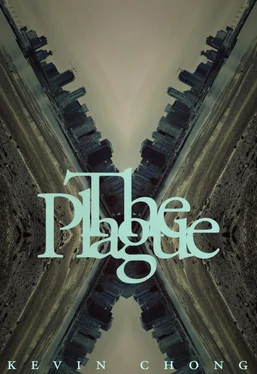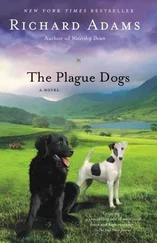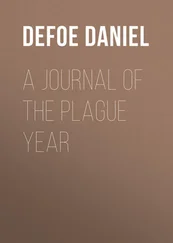Her rambling digressions exhausted the tourists, whose attention returned to their copies of Lonely Planet. “Please note the stops on the itinerary. We will visit every one of those at the appointed times, but I may park a while at a couple of other personal favourites.”
They stopped for thirty minutes at that shopping street, the Vancouver version of Rodeo Drive. New tourists boarded there, including a young woman who sat next to Tso at the front of the bus and wouldn’t stop coughing into her phone, in which she was texting in Japanese. The bus started down another busy street toward the city’s famous park.
Tso was looking out the window when the Japanese woman coughed again. As she rose Tso caught a glimpse of the bloody Kleenex she clutched in her hand. (If Tso’s observation is correct, this would be one of the earliest indications that the infection had progressed to its pneumonic form. This would have preceded the first officially documented case by at least three days.) The woman walked to Grossman’s seat while the bus was stopped at a red light. She whispered in Grossman’s ear, but the driver’s headset microphone broadcast the woman’s brief statement: “I believe I have it.” Grossman turned off the mike. The bus lurched into the intersection.
She switched on her mic. “Excuse me, ladies and gentlemen and those of you who are both and neither, we will not be going to Stanley Park, as I promised. Not yet. Instead we will be embarking on the off-the-menu part of our tour,” she said. “Our first stop is the West End where you’ll find many bike-rental shops, a fine pierogi place, and, oh look, the answer to your picture-framing needs. Famous residents include that dipsomaniac novelist Malcolm Lowry. Growing up on the east side, I thought everyone who led an interesting life in Vancouver—and there weren’t many—inhabited these streets. I would take the bus down here as a teenager, look at comic books on Granville Street and wander these residential streets, hoping someone from one of the buildings would run out onto the street and kidnap me into their cosmopolitan life.”
The Japanese woman was visibly sweating. She had taken a seat directly behind Grossman now. She shivered and repeated the same Japanese phrase in a baby voice. Tso tried to talk to her, but the woman waved her off. The bus turned down Nelson Street.
Grossman related the story of Errol Flynn’s death as they entered the emergency department lot. She took a wide turn in the driveway and blocked an ambulance. The hospital, with its arched Edwardian windows and tin roof, seemed to contain the city’s reserve of red brick. (It was one of only a few anomalous throwbacks in this city of steel and glass condo towers that were built to melt into one another.) “Well, I hope I haven’t soured you on our fine healthcare system in the city and country. Here we are at St. Paul’s Hospital where you’ll be free to disembark and look around. The next tour bus will pick you up only six blocks from here. Please direct all comments and suggestions to our website or office number. Have a great day.”
Grossman draped the Japanese tourist’s arm over her shoulder and led her off the bus. People filed out after them. The Asians were spooked, the Europeans bemused. The Americans tried to give cash tips. Tso stood by the open bus door, watching as the Japanese passenger stopped and turned back.
“She wants her purse,” Grossman told her.
Tso found the purse on her seat. As she stepped out, an ambulance driver told her to move her vehicle. Tso offered to check the woman in at reception so Grossman could re-park her bus. “You don’t want to lose your job,” Tso told her. “I’ll handle it.” Grossman’s reaction—a slight recoiling—suggested that she didn’t often get much assistance, and being offered help felt like a questioning of her competency.
In the waiting room, people took inventory of one another as they coughed and shivered in their chairs. Some were doubled over, others wore blankets. She found a seat for the woman and tried to check her in using the information in the passport that she’d retrieved from her purse.
“How are you related to this woman?” the nurse asked from behind a partitioned booth.
“I don’t—I’m not. I met her on the tour bus. We’re tourists.”
“I see. And you were saying she was feeling uncomfortable?”
Tso hesitated. Should she mention she’d seen this woman coughing blood? What if she had just imagined it? She no longer trusted her memory. What she said would affect this woman’s treatment. What if she withheld the detail—what would happen then? Finally, she told the nurse what she saw. The clatter of the nurse’s data entry slowed.
“It was just what I thought I saw,” Tso said.
“That’s all you need to tell us. The doctors will check your observation.”
Tso returned to the Japanese woman slumped in her seat. “Yuko?” she said, repeating the name on the passport. The woman looked up. Tso told her that she would be getting help. Did she understand? She nodded. How was she feeling? She nodded again. Did she need anything? She made a drinking gesture with her hand. Then she said, “Water.”
At the vending machine she dug through her collection of Canadian coins. How lucky she was not to be sick in a foreign country. Like Yuko. People imagine the ideal death to be in your own bed. Tso thought that she’d be satisfied dying in a country in which she was a passport-holder.
She recalled that a doctor who’d treated an early SARS patient had travelled from Guangdong to Hong Kong to attend a wedding in 2003. He went through the security controls that kept Mainland Chinese from Hong Kong. The former British colony was under its own sequester. The first press report about SARS was a denial, but everyone knew better and began to stockpile vinegar, a traditional remedy for the disease. They cleaned their hands in vinegar, wiped bus seats with it. The doctor was aware that the case of flu he had seen was atypical. Over three hundred people had already become ill; five of them had died. But he had taken precautions and deemed himself safe to travel. He took a ninth-floor room in the Metropole Hotel in Kowloon. The next day, he felt too ill to attend the wedding but well enough to walk to a nearby hospital. When he was admitted, he told them to lock him up. No one at the Kwong Wah hospital knew what they were dealing with. A month later, the doctor died, and eighty-seven medical staff members and students had fallen ill. The disease spread from his hotel room to Hanoi, Singapore, Taipei, Toronto, and Vancouver. Only in Vancouver were necessary precautions taken—an infected fifty-five-year-old man was isolated—and an outbreak was prevented.
When Tso turned back, the Japanese woman was no longer in her seat. Only her purse remained; she had taken her phone. She was being wheeled down a hall by nurses in hazmat suits. The hall seemed to stretch further in Tso’s head than in reality as she thought about Yuko’s reaction to not having a purse. She had written something about how dying people reach for their wallets when they wake. We’re trained to think of every process, even the biological ones, as a transaction. Tso grabbed the purse and called out to them. The doors closed.
Raymond Siddhu needed the walk home from the bus stop to clear the exhaust fumes from his lungs. There was no sidewalk where they lived, so he would step into the outer lip of a grassy ditch whenever a car passed by. A neighbour once called the cops when he saw him on his evening stroll. Siddhu could not fault his neighbour; being a pedestrian qualified as a suspicious activity here. The physical aloofness of suburban life—different from the more social standoffishness seen within the city limits—would keep his family safe as long as they avoided the mall and cleaned their hands after paying at the drive-thru window.
Читать дальше












